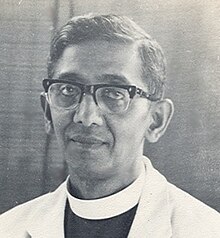Portal:Sri Lanka
The Sri Lanka Portal Sri Lanka, historically known as Ceylon and officially the Democratic Socialist Republic of Sri Lanka, is an island country in South Asia. It lies in the Indian Ocean, southwest of the Bay of Bengal, separated from the Indian peninsula by the Gulf of Mannar and the Palk Strait. It shares a maritime border with the Maldives in the southwest and India in the northwest. Sri Lanka has a population of approximately 22 million and is home to many cultures, languages and ethnicities. The Sinhalese people form the majority of the population, followed by the Sri Lankan Tamils, who are the largest minority group and are concentrated in northern Sri Lanka; both groups have played an influential role in the island's history. Other long-established groups include the Moors, Indian Tamils, Burghers, Malays, Chinese, and Vedda. Sri Lanka's documented history goes back 3,000 years, with evidence of prehistoric human settlements dating back 125,000 years. The earliest known Buddhist writings of Sri Lanka, known collectively as the Pāli canon, date to the fourth Buddhist council, which took place in 29 BCE. Also called the Pearl of the Indian Ocean, or the Granary of the East, Sri Lanka's geographic location and deep harbours have made it of great strategic importance, from the earliest days of the ancient Silk Road trade route to today's so-called maritime Silk Road. Because its location made it a major trading hub, it was already known to both East Asians and Europeans as long ago as the Anuradhapura period. During a period of great political crisis in the Kingdom of Kotte, the Portuguese arrived in Sri Lanka and sought to control its maritime trade, with a part of Sri Lanka subsequently becoming a Portuguese possession. After the Sinhalese-Portuguese war, the Dutch Empire and the Kingdom of Kandy took control of those areas. The Dutch possessions were then taken by the British, who later extended their control over the whole island, colonising it from 1815 to 1948. A national movement for political independence arose in the early 20th century, and in 1948, Ceylon became a dominion. It was succeeded by the republic of Sri Lanka in 1972. Sri Lanka's more recent history was marred by a 26-year civil war, which began in 1983 and ended in 2009, when the Sri Lanka Armed Forces defeated the Liberation Tigers of Tamil Eelam. (Full article...) Selected article -Colombo (/kəˈlʌmboʊ/ kə-LUM-boh; Sinhala: කොළඹ, romanized: Koḷam̆ba, IPA: [ˈkoləᵐbə]; Tamil: கொழும்பு, romanized: Koḻumpu, IPA: [koɻumbɯ]) is the executive and judicial capital and largest city of Sri Lanka by population. According to the Brookings Institution, the Colombo metropolitan area has a population of 5.6 million, and 752,993 in the Municipality. It is the financial centre of the island and a tourist destination. It is located on the west coast of the island and adjacent to the Greater Colombo area which includes Sri Jayawardenepura Kotte, the legislative capital of Sri Lanka, and Dehiwala-Mount Lavinia. Colombo is often referred to as the capital since Sri Jayawardenepura Kotte is itself within the urban/suburban area of Colombo. It is also the administrative capital of the Western Province and the district capital of Colombo District. Colombo is a busy and vibrant city with a mixture of modern life, colonial buildings and monuments. It was made the capital of the island when Sri Lanka was ceded to the British Empire in 1815, and its status as capital was retained when the nation became independent in 1948. In 1978, when administrative functions were moved to Sri Jayawardenepura Kotte, Colombo was designated as the commercial capital of Sri Lanka. (Full article...)General imagesThe following are images from various Sri Lanka-related articles on Wikipedia.
Related portalsIndian Subcontinent Other countries Selected biography -Lynn Alton de Silva (16 June 1919 – 22 May 1982) was a Sri Lankan theologian and Methodist minister. He was the founder and editor of one of the first theological journals on Buddhist-Christian encounter called Dialogue (1961–1981), chief translator for the revision of the Old Testament of the Sinhalese Bible published as New Sinhala Bible (1973–1982), and director of the Ecumenical Institute for Study and Dialogue (EISD) in Sri Lanka (1962–1982). Lynn de Silva is widely regarded as one of the foremost Christian practitioners of Buddhist-Christian dialogue in Sri Lanka, and also as one of the pioneers in this dialogue. Lynn de Silva's book titled Buddhism: Beliefs and Practices in Sri Lanka (de Silva 1974) was mentioned in two journals in the early 1980s as being unparalleled as an introduction to Buddhism in Sri Lanka. Possibly his most notable contribution to theology is the book titled The Problem of the Self in Buddhism and Christianity (de Silva 1979), in which he points out an age-old misconception held by Buddhists and Christians that the notion of an immortal soul is a biblical teaching. This book is considered by Schmidt-Leukel to be one of the classics in Buddhist-Christian dialogue, and one which has become well known among those actively involved in this dialogue. The book was also included in John Hick's Library of Philosophy and Religion series. (Full article...)Did you know (auto-generated)
Selected picture
Photo credit:Faslan
Horton Plains National Park lies at a height of more than 2,000 m in the central highlands. More did you know -
TopicsSubcategoriesNew articlesThis list was generated from these rules. Questions and feedback are always welcome! The search is being run daily with the most recent ~14 days of results. Note: Some articles may not be relevant to this project.
Rules | Match log | Results page (for watching) | Last updated: 2024-06-21 21:40 (UTC) Note: The list display can now be customized by each user. See List display personalization for details.
Web resourcesThings you can doWikipedias in Sri Lankan languagesAssociated WikimediaThe following Wikimedia Foundation sister projects provide more on this subject:
Discover Wikipedia using portals |






































































